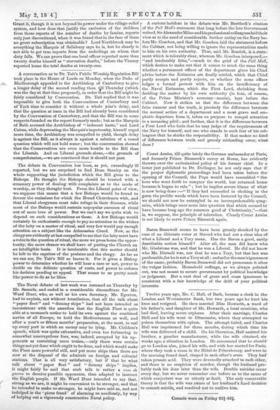The debate in Convocation has been, as yet, exceedingly ill
reported, but we are surprised to find Dean Stanley on the whole supporting the jurisdiction which the Bill gives to the Bishops. He thought the Bishops should be trusted with a -summary power of dealing with complaints as to the mode of worship, as they thought best. From the Liberal point of view, -we suppose this means that a few Bishops would be found to favour the omissions for whieh the Broad Churchmen wish, and -that Liberal clergymen must take refuge in their dioceses, while most of. the Bishops would restrain unpopular excesses of ritual -out of mere love of power. But we can't say we quite wish to depend on such considerations as these. A few Bishops would certainly lie enthusiastic enough to pay no attention to the wishes of the laity on a matter of ritual, and very few would pay enough -attention on a subject like the Athanasian Creed. Now, as the clergrare evidently at last compelled to see that the laity must have a voice in the question of ritual, the more we press home the oppor- tunity; the more chance we shall have of putting the Church on an intelligible basis. It is intolerable that this matter should be left to the caprices of the prelates and the clergy. As far as -we can see, Dr. Tait's Bill so leaves it. For it gives a Bishop power to determine whether he will hear a case or not, power to .decide on the delicate question of costs, and power to enforce his decision pending an appeal. That seems to us pretty much like power to do as he likes.


































 Previous page
Previous page